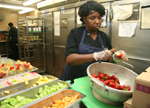|
|
|

|
Patients value freshness, support local farmers
|
by Cindy Abole
Public Relations
Prep cook Mary Goodwater loves to hear that the fresh fruit cups she
makes every morning in the patient food service kitchen are one of the
most popular menu items ordered by MUSC in-patients. Like most of the
MUSC Food and Nutrition staff, Goodwater is up early and working in the
hospital kitchen preparing and cutting up fresh melons, pineapples and
strawberries as she creates 200-plus single serving cups and other food
items for patients.
 Mary Goodwater uses
fresh fruit, locally grown fruit to prepare breakfast for MUSC patients. Mary Goodwater uses
fresh fruit, locally grown fruit to prepare breakfast for MUSC patients.
What’s key here is that Goodwater and a team of prep, line and
satellite cooks are using fresh and mostly locally grown products. MUSC
and Sodexo’s goal is to provide patients, workers and the communities
that they serve with healthier and tastier foods.
It’s well known that hospitals and medical centers get no respect when
it comes to taste and creativity of hospital food. This is a challenge
MUSC Patient Food Services and At Your Request executive chef Brett M.
Cunningham wants to change.
“It’s my goal to try and change the mindset of all Americans that
hospital food is changing for the better thanks to more hospitals like
MUSC who are committed to supporting sustainable foods and local
farmers. Because of this, we’re providing both patients and our
customers with healthier, more nutritious food items on our menus,”
said Cunningham.
Recently, MUSC and its food service partner, Sodexo, upgraded their
patient food services program to offer a new food-to-order,
computerized food system at Ashley River Tower (2008) and university
hospital (2009). Sodexo’s At Your Request (AYR) program offers improved
patient meal preparation with a patient-centered approach to dining.
According to Cunningham, patients enjoyed making choices from
selections of freshly prepared and nutritious foods, which led to
improved overall customer satisfaction. Its success inspired him, Brad
Masteller, food and nutrition general manager, and other hospital chefs
to consider expanding their goals for eating healthy by incorporating
more sustainable foods and working with local farmers and food
suppliers to provide more locally-sourced food.
As a large medical center and teaching hospital, MUSC uses a variety of
food suppliers to provide products for both patient food service and
retail lines. It’s estimated that the university hospital’s patient
services group prepares about 1,500 meals per day and accommodates 52
different types of diets for adult and pediatric patients in the main
hospital, Institute of Psychiatry (IOP) and IOP’s Seasons, Impact and
STAR Ladson treatment programs.
For produce and fruit, the hospital contracts with Limehouse Produce, a
local business based on John’s Island. Each weekday, MUSC receives one
or two pallets of seasonable vegetables, herbs and fruits. In October,
Cunningham, Fred Bennett, MUSC-Sodexo retail executive chef, and a
dozen statewide and regional Sodexo hospital services chefs toured
Rosebank Farms on John’s Island to gain more insight about
sustainability practices and to see the variety of produce being grown.
Rosebank is one of several local farms that supplys Limehouse Produce.
When Cunningham began offering fresh green beans, zucchini, cauliflower
and fresh fruits in the AYR menu’s fruit cups, he got rave reviews from
satisfied patients during his meal rounding with patients at the
bedside. The MUSC Excellence Patient Satisfaction scores for
Cunningham’s araas have jumped higher than they have ever been since
January. He attributes this to the improved quality of food and service.
According to Cunningham, Food and Nutrition is considering a
partnership with seafood supplier, Lowcountry Shellfish, to provide
quality products at reasonable prices.
Masteller also is proud that MUSC extends its sustainability practices
beyond the food system. For several years, dietary services has
supported food nutrition and healthy vending, improved food service
ware products using biodegradable items and installed three water
dispensers to reduce the use of bottled water in the cafeteria.
Masteller reminded employees that the cafeteria’s eco mug program
offers a 25 cent discount when they use their own cup for a fountain
drink.
“It’s a challenge to our customers,” Masteller said. “The initiatives
are there, but it’s everyone’s choice to take advantage of these
programs to make a difference.”
Friday, Nov. 26, 2010
|
|
|



